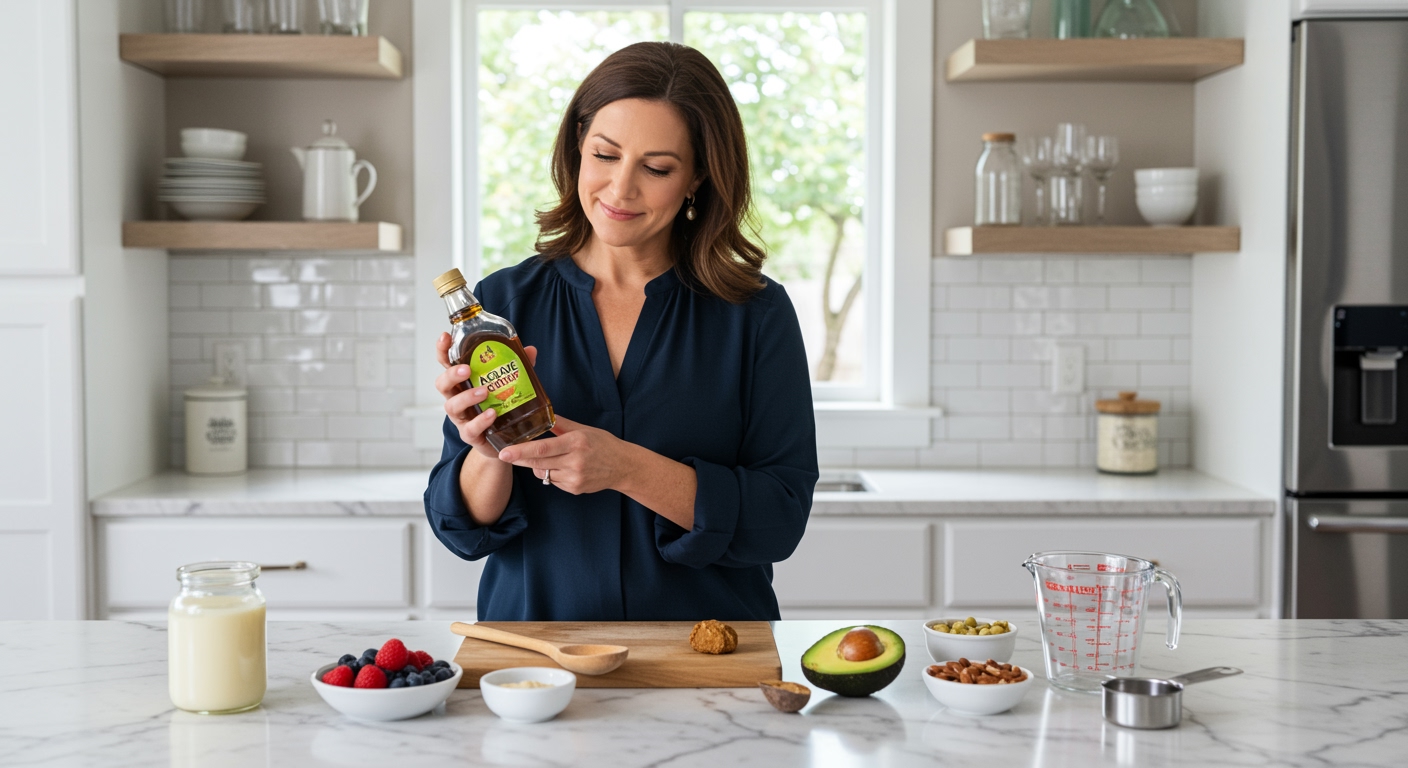✪ Key Takeaway: Agave is not always bad for PCOS when used in small amounts occasionally, but it should not be your go-to sweetener choice.
Introduction
You walk down the health food aisle and see agave syrup marketed as a natural, healthy sweetener alternative.
Then you read online that women with PCOS should avoid agave completely because it will worsen insulin resistance and hormone imbalances.
Hi, I’m Abdur, your nutrition coach, and today I’m going to explain the real truth about agave and PCOS so you can make informed decisions about this controversial sweetener.
What Makes Agave Different From Other Sweeteners?
Agave syrup comes from the agave plant and contains about 85% fructose and 15% glucose.
This high fructose content makes agave significantly different from table sugar, which contains equal parts fructose and glucose.
Your liver processes fructose differently than glucose, converting it directly into fat storage when consumed in large amounts.
The glycemic index of agave ranges from 10-19, which is much lower than table sugar at 65.
This means agave causes a slower rise in blood sugar compared to regular sugar, but the high fructose content creates other metabolic concerns.
✪ Fact: Agave contains more fructose than high fructose corn syrup, which typically contains 55% fructose.
How Does Agave Affect PCOS Symptoms?
Women with PCOS often struggle with insulin resistance, which affects how their bodies process different types of sugars.
The high fructose content in agave bypasses normal glucose metabolism and goes straight to your liver for processing.
This can lead to increased fatty liver development and worsen metabolic dysfunction over time.
However, the lower glycemic index means agave causes less immediate blood sugar spikes compared to regular sugar.
Some women with PCOS find they can tolerate small amounts of agave better than other sweeteners when used occasionally.
The key lies in understanding that frequency and quantity matter more than complete avoidance for most people.
✪ Pro Tip: Track your blood sugar response to agave using a glucose meter to understand your individual tolerance.
When Might Agave Be Acceptable For PCOS?
Agave can be acceptable for women with PCOS in specific circumstances and when used mindfully.
If you are transitioning away from artificial sweeteners and need a natural alternative occasionally, small amounts of agave might work.
Women who have their PCOS symptoms well-controlled through diet and lifestyle may tolerate occasional agave use better than those with active symptoms.
Using agave in homemade treats that you make once or twice per month is different from daily consumption.
The portion size matters significantly – one teaspoon occasionally is very different from multiple tablespoons daily.
Always pair agave with protein or healthy fats to slow absorption and minimize metabolic impact.
✪ Note: Women with severe insulin resistance should avoid agave and choose stevia or monk fruit instead.
What Are Better Sweetener Options For PCOS?
Stevia remains the top choice for women with PCOS because it does not affect blood sugar or insulin levels.
Monk fruit sweetener offers another excellent option with zero calories and no impact on glucose metabolism.
Small amounts of raw honey may be better than agave because it contains beneficial enzymes and has a lower fructose content.
Erythritol works well for baking and has minimal impact on blood sugar, though some people experience digestive issues.
The best approach is to gradually reduce your sweet tooth rather than constantly seeking sweetener substitutes.
Focus on naturally sweet foods like berries, cinnamon, and vanilla to satisfy cravings without added sweeteners.
✪ Pro Tip: Mix stevia with a tiny amount of agave to mask stevia’s bitter aftertaste while minimizing fructose intake.
The Bottom Line
Agave is not always bad for PCOS, but it should not be your first choice sweetener due to its high fructose content.
The dose makes the poison, and context determines the outcome – occasional small amounts may be acceptable for some women with well-controlled PCOS symptoms.
I would love to hear about your experiences with different sweeteners and PCOS management, so please share your thoughts and questions in the comments below.
References
At NutritionCrown, we use quality and credible sources to ensure our content is accurate and trustworthy. Below are the sources referenced in writing this article:
- PCOS Diva: Ask Amy: Is Agave Okay to Use as a Sweetener?
- PCOS Meal Planner: Glycemic Index of Sweeteners: Complete Comparison Guide for PCOS
- RxList: Agave Supplements Information
- Allara Health: PCOS and Sugar: Every Single Thing You Want to Know





